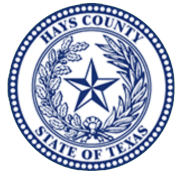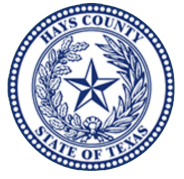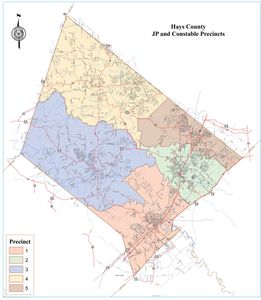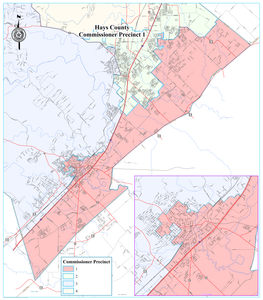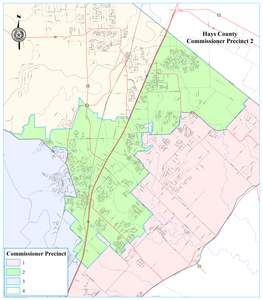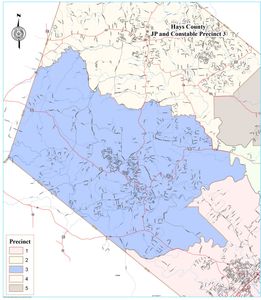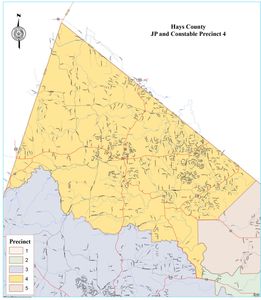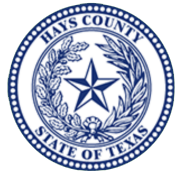Welcome TO HAYS COUNTY!
Hays County is in Central Texas. It was established in 1848. Our County Seat is
San Marcos. Visit this
page
to learn more about our history.

Announcements

By Natalie Frels
•
22 Jul, 2024
Click here to download the notice. Hays County Elections has called the County Election Board Meeting for the November 5, 2024, General Election. The meeting details are as follows: Location: Hays County Elections Office 120 Stagecoach Trail San Marcos, Texas 78666 Time: 10:00 AM Per Sec. 51.002 of the Texas Election Code a county election board is established in each county for the general election for state and county officers, a special election for an officer regularly elected at the general election, and any other elections ordered by a county authority or held at county expense. · For the general election for state and county officers and for a special election for an officer regularly elected at the general election, the county election board consists of the County Judge, Elections Administrator (Chair), Sheriff, Democratic Party County Chair and Republican Party County Chair. Board Tasks · Consolidation of Voting Locations in Special Elections. · Procuring and Allocating Supplies, Sec. 51.003 · Appointment of Early Voting Ballot Board, Sec 87.002 · Receiving Notification of Logic and Accuracy Testing, 129.023 · Sheriff Duties Members of other parties represented on the ballot may submit names for the Early Voting Ballot Board.

By Natalie Frels
•
19 Jul, 2024
To read the original notice, click here . Notice of Open Deliberations Pursuant to Section 174.108 of the Fire and Police Employee Relations Act, this public notice is provided regarding deliberations relating to collective bargaining between: Hays County, Texas and the Hays County Law Enforcement Association (HCLEA) as the exclusive bargaining agent on behalf of the police officers of the Hays County Sheriff’s Office and the Hays County Constable Offices Date/Time: Wednesday, July 24, 2024, at 10:00 a.m. Location: Hays County Public Safety Building Room 1304 – Dispatch Training Room 810 S. Stagecoach Trail San Marcos, Texas 78666 Subject: Contract negotiations providing for collective bargaining between Hays County, Texas (“County”) and the Hays County Law Enforcement Association (“HCLEA”). Public Notice Members of the public and press are permitted to observe and monitor the deliberation, but active participation in discussions or presentations is expressly prohibited unless permitted by the Ground Rules established by the County and HCLEA. Representatives for either the County or HCLEA may suspend the meeting at any time during the proceedings for consultation with their respective attorney. Pursuant to Section 551.071 of the Texas Government Code, the County’s deliberations during this period are closed to the public. Accessibility Statement for Disabled Persons. This meeting site is accessible to disabled persons as follows: the meeting room is on the first floor of the building and entrance to the building is accessible. Parking spaces reserved for disabled persons are in front of the entrance. The use of cellular phones or sound activated pager is prohibited while deliberations are being conducted. Please step outside the meeting room should you elect to utilize these devices.

By natalie frels
•
18 Jul, 2024
By the order of the Hays County Commissioners Court, notice is hereby given that on July 30th, 2024 at 9 a.m. in the Hays County Courthouse, 111 E. San Antonio Street, the Hays County Commissioners Court will discuss the following item in open court: Woodcreek Section 22, Reserve C, Replat

News

By Natalie Frels
•
24 Jul, 2024
SAN MARCOS, Texas – The Hays County Health Department (HCHD) received notification on July 24, 2024, that there was a laboratory-confirmed, positive human case of West Nile Virus. This is the first reported human case of West Nile Virus (WNV) for the 2024 season in Hays County. The patient is a resident of the 78610 ZIP code and was diagnosed with West Nile Fever. Due to privacy and confidentiality reasons, HCHD does not disclose any additional information about the patient. While 80% of people will not experience symptoms of an infection, only 20% of people may experience some symptoms. Symptoms of West Nile Virus infection can include fever, headache, body aches, joint pain, vomiting, diarrhea, a skin rash on the torso of the body and swollen lymph nodes. While the risk for severe symptoms is low, individuals aged 50 and older and those with compromised immune systems may be at an increased risk for stiffness, disorientation, coma, tremors, vision loss, paralysis and, in extremely rare cases, death. Anyone experiencing these symptoms is encouraged to seek medical attention. Supportive care — treatment to improve quality of life and comfortableness — is typically provided to diagnosed patients. Patients can expect to exhibit symptoms for 3-6 days but may experience fatigue and weakness for weeks or even months. Treatment for the virus is not effective due to the resistant nature of the virus to antibiotics and other medications. WNV is a disease that is spread by the bite of an infected mosquito. Mosquitoes can become infected when they feed on the blood of infected birds. The infected mosquitoes can then transmit WNV to humans and animals. Severe WNV infections can cause neurologic complications such as encephalitis and/or meningitis. Hays County Epidemiologist Ian Harris reminds residents that “West Nile Virus is not contagious and that humans are ‘dead-end host,’ humans are not capable of transmitting the virus to other individuals.” DSHS confirmed a second positive mosquito pool in the unincorporated area of the 78666 ZIP code on July 23, 2024. The first reported positive mosquito pool for WNV in Hays County was on July 19, 2024. There were no positive West Nile Virus mosquito pools during the 2023 season. In the state of Texas, DSHS reported 913 positive mosquito pools during the 2023 season for West Nile Virus. As of July 20, 2024, DSHS has reported 1327 positive mosquito pools for West Nile Virus. The key to preventing West Nile Virus is to minimize the number of mosquitoes in areas where people live, work and play. Public health officials strongly encourage everyone to remain vigilant about protecting themselves from mosquito bites and preventing mosquito breeding on their properties. Mosquitoes can breed in as little as one teaspoon of standing water. By draining all sources of standing water in and around your property, you reduce the number of places mosquitoes can lay their eggs and breed. HCHD reminds resident to remember the 3 D’s: DEET, Dress and Drain. DEET: Whenever outside, use insect repellents with the active ingredient DEET or other EPA-registered repellents, and always follow label instructions. DRESS: Wear long, loose and light-colored clothing outside. DRAIN: Drain or treat all standing water in and around your home or workplace where mosquitoes could lay eggs. Hays County Development Services is providing mosquito surveillance within the county to monitor and track mosquito-borne illnesses. Some mosquitoes can transfer potentially deadly diseases – known as arboviral diseases – to humans. HCDS is collecting mosquitoes to determine which areas are harboring disease-carrying mosquitoes. HCDS will set up collection traps across the county on a rotating basis to capture samples of several species of mosquitoes that will be sent to the Department of State Health Services in Austin for identification and determination of the type(s) of illness the mosquitoes could be spreading. Monitoring species, mosquito density and geographic breeding sites will provide critical early predictive data to HCDS to help monitor, prevent and combat mosquito populations and mosquito-borne illnesses. HCDS uses the Centers for Disease Control and Prevention (CDC) gravid-trapping method to collect mosquitoes. This trap is designed to attract female mosquitoes which are ready to lay eggs. The trap uses a fan to draw in mosquitoes that approach the liquid in the bottom of the bucket and keeps them in a collection bag until the trap is collected. HCDS also uses the BG-Sentinel trap. This trap targets other mosquito species that are vectors of other arboviruses. Collection is typically carried out from May until November throughout Texas. Hays County Development Services and the Hays County Health Department will continue to conduct mosquito pool traps and health surveillance to promote the health and safety of our residents. For more information regarding mosquito abatement, contact Hays County Development Services at 512-393-2150. Residents can view Mosquito Tracking Locations via the Hays County Development Services GIS Dashboard at https://bit.ly/HaysCountyMosquitoTrackingLocations. Visit the Texas Department of State and Health Services West Nile website for more information on the disease at txwestnile.org.

By Natalie Frels
•
19 Jul, 2024
WIMBERLEY, Texas – The Hays County Health Department (HCHD) received confirmation from the Texas Department of State Health Services (DSHS) on July 18, 2024, that several mosquito trap samples collected in the 78676 ZIP code tested positive for West Nile Virus. The positive samples were collected from two sites in and around the city of Wimberley on July 11, 2024. These are the first reported West Nile Virus-positive IDs of the 2024 season in Hays County. There were no positive West Nile virus mosquito pools during the 2023 season. In the state of Texas, DSHS reported 913 positive mosquito pools during the 2023 season for West Nile Virus. So far this year, DSHS has reported 1051 positive mosquito pools for West Nile Virus. “Rainfall within the Central Texas area leads to an increase in standing water, which provides ideal breeding grounds for mosquitos,” said Eric Vangaasbeek, chief environmental health specialist at Hays County Development Services (HCDS). "We encourage everyone to take proactive steps to prevent mosquito bites by reducing areas of standing water around their homes and properties.” While 80% of people will not experience symptoms of an infection, only 20% of people may experience some symptoms. Symptoms of West Nile Virus infection can include fever, headache, body aches, joint pain, vomiting, diarrhea, a skin rash on the torso of the body and swollen lymph nodes. While the risk for severe symptoms is low, individuals aged 50 and older and those with compromised immune systems may be at an increased risk for stiffness, disorientation, coma, tremors, vision loss, paralysis, and, in extremely rare cases, death. Anyone experiencing these symptoms is encouraged to seek medical attention. Supportive care — treatment to improve quality of life and comfortableness — is typically provided to diagnosed patients. Patients can expect to exhibit symptoms for 3-6 days but may experience fatigue and weakness for weeks or even months. Treatment for the virus is not effective due to the resistant nature of the virus to antibiotics and other medications. The key to preventing West Nile Virus is to minimize the number of mosquitoes in areas where people live, work and play. Health officials strongly encourage everyone to remain vigilant about protecting themselves from mosquito bites and preventing mosquito breeding on their properties. Mosquitoes can breed in as little as one teaspoon of standing water. By draining all sources of standing water in and around your property, you reduce the number of places mosquitoes can lay their eggs and breed. “While we continue to monitor the situation, please try to avoid mosquito bites by following the three Ds: DEET, Dress and Drain,” said Ian Harris, HCHD epidemiologist. DEET: Whenever outside, use insect repellents with the active ingredient DEET or other EPA-registered repellents, and always follow label instructions. DRESS: Wear long, loose and light-colored clothing outside. DRAIN: Drain or treat all standing water in and around your home or workplace where mosquitoes could lay eggs. Hays County Development Services is providing mosquito surveillance within the county to monitor and track mosquito-borne illnesses. Some mosquitoes can transfer potentially deadly diseases – known as arboviral diseases – to humans. HCDS is collecting mosquitoes to determine which areas are harboring disease-carrying mosquitoes. HCDS will set up collection traps across the county on a rotating basis to capture samples of several species of mosquitoes that will be sent to the Department of State Health Services in Austin for identification and determination of the type(s) of illness the mosquitoes could be spreading. Monitoring species, mosquito density and geographic breeding sites will provide critical early predictive data to HCDS to help monitor, prevent and combat mosquito populations and mosquito-borne illnesses. HCDS uses the Centers for Disease Control and Prevention (CDC) gravid-trapping method to collect mosquitoes. This trap is designed to attract female mosquitoes which are ready to lay eggs. The trap uses a fan to draw in mosquitoes that approach the liquid in the bottom of the bucket and keeps them in a collection bag until the trap is collected. HCDS also uses the BG-Sentinel trap. This trap targets other mosquito species that are vectors of other arboviruses. Collection is typically carried out from May until November throughout Texas. Hays County Development Services and the Hays County Health Department will continue to conduct mosquito pool traps and health surveillance to promote the health and safety of our residents. For more information regarding mosquito abatement, contact Hays County Development Services at 512-393-2150. Visit the Texas Department of State and Health Services West Nile website for more information on the disease at txwestnile.org.

By natalie frels
•
16 Jul, 2024
LIMA SUR, Perú — “Todos de pie!” With this call to order from a former soldier turned bailiff, an audience of Peruvian judges rose to their feet, and Hays County District Judge Tanner Neidhardt opened the first mock jury trial in Lima Sur, Perú. “Their reactions were fascinating,” Judge Neidhardt said. “Imagine seeing a legal process play out for the first time. Although the judges/jurors had seen movies about jury trials, they had never seen jury selection. They were captivated by the process.” The trial was part of an intensive program to train Peruvian judges about evidentiary rules and concepts used in criminal cases. Since 2006, Perú has incrementally transitioned to an American-style legal system based on testimonial evidence — invoking questions about hearsay, character evidence and relevance. Before that, Perú used the Spanish-based inquisitive system, which requires judges to lead investigations, direct the collection of evidence, charge the offense and conduct the proceedings. “Since the implementation of the adversarial system for criminal cases in Perú, it has been an ongoing challenge to improve the capabilities of justice operators in oral litigation,” said Raúl Callirgos, country director for the American Bar Association Rule of Law Initiative (ABA ROLI) in Perú. “The training of judges has been of special interest given their position as directors of oral hearings.” That is where the Hays County judge came into play. “Judge Neidhardt, of Hays County, contributed to this task with great interest, commitment and responsibility through training workshops focused on improving the skills of Peruvian judges to evaluate and analyze evidence for criminal cases,” Callirgos said. Judge Neidhardt, a Spanish speaker from days as a Fulbright Scholar in Bogotá, Colombia, gave eight speeches during the five-day training, all in the attendees’ native language. In the afternoons, he directed practical exercises in evidentiary rulings. His background, including more than 150 trials as an attorney and as a district judge of the 483rd Court of Hays County, offered a sounding board for the Peruvian judges’ questions handling trial evidence. Callirgos characterized this background as “important given that in the ‘Lima Sur’ area there is a high percentage of criminal cases, and strengthening the skills of judges to analyze evidence contributes to improving the quality levels of sentences and the number of dispositions.” This was Judge Neidhardt’s fourth time to lead trainings for ABA’s Rule of Law Initiative. Previous programs provided training for prosecutors, defense attorneys and law enforcement. The program is a collaboration between the United States government through the Anti-Narcotics and Law Enforcement Section – INL, the U.S. Embassy in Perú and the American Bar Association. “It is always rewarding to go to Perú and exchange ideas about our legal system,” Judge Neidhardt said. “It makes me think critically about our system and that makes me better as a judge. And I was proud to represent Hays County.” ###
Find it Fast

Calendar
Find upcoming meetings, public hearings events and more

Sign Up for Emergency Alerts
Quick Links
Hays County, Texas
Main County Mailbox:
712 S. Stagecoach Trail
San Marcos, Texas 78666
Main Number: 512-393-7779
Connect with us!
©Copyright 2023-24 Hays County, Texas | Website by Munission
